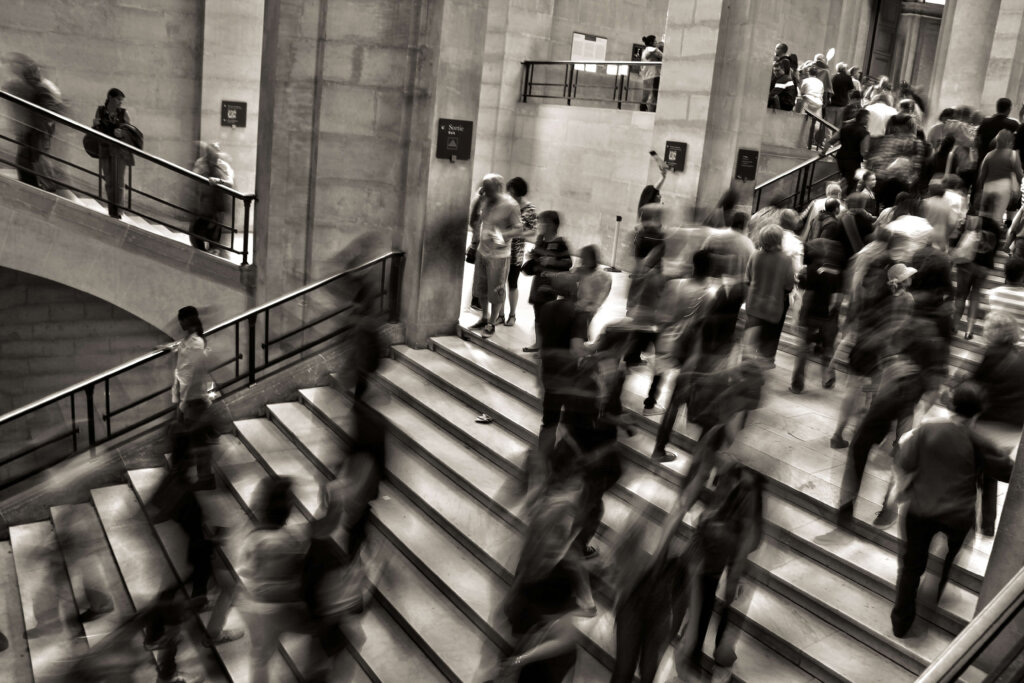The Ruthless Elimination of Hurry by John Mark Comer is a book on simple living.
Comer spends a lot of time defining the idea of hurry and how the modern world creates the chaotic existence of hurry that has quickly become our everyday norm.
2007 is likened to the Gutenberg Press of 1440. What’s so special about 2007? It’s the year the iPhone was introduced, it’s also when Facebook opened to anyone with a valid email address, and Twitter entered the chat.
Comer spends the remainder of the book explaining How to Stay Emotionally Healthy and Spiritually Alive in the Chaos of the Modern World despite the cultural addiction to hurry.
He discusses the problem, and the solution, and provides four practices for how to live a simple life. One that is unhurried and intentional, centered on Christ, filled with prayer, and not lacking in rest.

Part 1: The Problem
The ruthless elimination of hurry starts with the problem of the day.
Hurry is not something I have to define for you. We all know the feeling. From the time our alarms go off, to the time we stop scrolling exhausted in bed, hurry is the undertone that keeps us in motion, unable to be present, and unrested all hours of the day.
Turns out, this has a lot of issues and is detrimental to our spiritual life. John Mark Comer is a pastor if you didn’t know. He opens the book talking about his own experience with hurry as a pastor of a mega-church with too many campuses to count and the responsibility to preach up to six sermons a Sunday. He drastically changed his life when he stepped down to pastor a single campus.
The Spiritual Problem with Hurry
In a world filled with distraction and hurry, our minds are absent from the things of God. Prayer, stillness, and general awareness of God throughout the day are lacking in modern Christian society. Comer points out that God is omnipresent. It’s not like God isn’t near, it’s that we have lost our ability to be aware of his presence.
Comer quotes Michael Zigarelli from the Charleston Southern University School of Business, a quote worth requoting here. Based on his survey of 20k+ Christians regarding obstacles to growth, Zigarelli finds:
- Christians are assimilating to a culture of busyness, hurry, and overload, which leads to →
- God becoming more marginalized in Christian’s lives
- A deteriorating relationship with God
- Christians becoming even more vulnerable to adopting secular assumptions about how to live, which leads to →
- More conformity to a culture of busyness, hurry, and overload.
The data speaks for itself. A hurried life where we are overloaded and too busy to be bothered results in a relationship that lacks closeness with God and therefore a lack of spiritual and emotional discernment.
As Corrie Ten Boom said, “If the devil can’t make you sin, he’ll make you busy.”
Tech and Hurry
We can’t discuss the problem of hurry without mentioning one of the most life-altering inventions (sounds so dramatic). The smartphone. Having a smartphone in your pocket at all times has truly changed the mental landscape.
Even more is the introduction of social media platforms, which have the sole purpose of taking up as much of your conscious and subconscious attention. The prevalence of technology and access to the daily highlights of others create a state of mind that believes life is happening out there and not in front of us.
This access feeds into absent-mindedness and distraction, which feeds into more distraction and absent-minded scrolling, which feeds into the sense that there isn’t, can’t possibly, would never in a million years be enough time to do everything we need to do and not be stressed out.
Comer employs a cell phone usage guilt trip that works on me every time. He encourages readers to check their screen time and do the math. What could you accomplish if those same hours were employed elsewhere? How many books could you have read? How many dinners could be cooked and kitchens cleaned? How about how many intentional conversations and time spent with those around you could you have?
I’ll be honest, I implemented another 30-day social media fast after reading this section of the book.
Materialism
And finally, materialism.
Comer spends ample time recounting the history of materialism in America. From an economy based on consumption to a multi-billion dollar industry dedicated to tickling the most basic of human desires to feed that economy, it appears that shopping has become the new religion in America.
The dedication to materialism, our new idea of “needs”, and the ever-present feeling of desire take up a large portion of our attention. Not only is the process of shopping and receiving items a time and attention waster, but the very act of owning things takes up time and attention.
The notion of less is more comes under many names–simple living, intentional living, and minimalism. These lines of thought all speak to less equating more time and energy to put towards living a more quiet, less hurried life.
We’ve all been there. How many times have you tripped over too many clothes on the floor? How about sorting through the 78 pairs of random one-off socks? I can’t tell you how wonderful it feels to clean and rid my house of these extra things that have accumulated.
This feeling and the resulting extra time to devote to the solution is Comer’s point in calling out what materialism has become in our culture.
The Solution
Comer lays out 4 practices for how to ruthlessly eliminate hurry.
1. Silence and Solitude
First up, Silence and Solitude. Jesus sought silence and solitude more than anything during his walk and time teaching and preaching. He would spend time on a mountain, time in a desert, time in the garden, alone, praying and seeking God.
If we want to eliminate hurry from our lives, we need to make space for silence and solitude. No phone, no music, no podcast, no multitasking. Silence and solitude. This practice of meditation on scripture and time praying and seeking the Lord is known in the secular world as a mindfulness practice. It is a trend for a reason. The practice allows for emotional and spiritual clarity. Such a practice helps you become more present, less distracted, and more aware of what actually matters.
2. Sabbath
Sabbath is one of the 10 commandments. Resting after 6 days of work is how God ended the first week on earth after he created it. The Sabbath is an extended period of rest. An entire day dedicated to stillness, feasting, and partaking in activities that you enjoy unto the Lord.
A modern-day sabbath practice according to Comer looks like a time when his family turns off cell phones on a Friday evening, not to be touched until the following Saturday evening. Friday typically kicks off with a giant chocolate chip cookie skillet that is then covered in ice cream. The following day is dedicated to rest, reading, silence, and solitude, feasting on good food, connection with family, and enjoying the week’s work. A true unplugged break.
3. Simplicity
The practice of simplicity and simple living is a solution to hurry. The cultural pull to buy and get and return and buy again has a price. The cost is time, energy, and attention. Where your time and money go, so goes your life.
Ask yourself before you buy, what is the cost of the item in time, energy, and brain space. Never impulse buy, buy fewer, better quality things (preferably those that are sustainable), give, share, cultivate an appreciation for the simple things, spend time in creation, and lead a cheerful content life.
4. Slowing
I’ll be honest, this one is the hardest for me to buy into. Efficiency and speed are near and dear to my heart. Not only that, but I would argue God enjoys efficiency. He created it after all.
Nevertheless, Slowing is the idea that we need to avoid trying to go as fast as we possibly can at all times. Comer says we instead need to drive the speed limit, come to complete stops at stop signs, walk slower, choose the longer checkout line, etc. The act of deliberately making slower choices is a way to remind us to get out of the fast lane of a hurried life.
This part of the solution is a reality check. Do you find yourself on edge, upset, and with higher blood pressure because someone cut you off in traffic? You need to check yourself and pull yourself out of the mindset of hurry.
Would I Recommend this Book?
In a nutshell, yes.
Do I have my thoughts about it? Yes.
The book is a short, easy read. I think 20% of its 300 pages are references in the back that you can skip (Comer does a lot of citing). In a perfect world, I would have preferred to see more scripture references and a little more definition when he dives into defining spiritual disciplines for an entire intermission section mid-book.
I also found the book started a little slow. Comer spends a lot of time talking about his experience with confronting hurry and changing his life. I get we have to have credibility and establish some ethos, but it was a slow start that didn’t add very much in the way of value to the reader.
When the book does dive into the meat and potatoes of the thesis, Comer holds nothing back when it comes to his citations. The book almost has too many citations. They are all really good excerpts, though, and I think it just shows that Comer is more a reader than he is a writer.
The fact that I felt convicted to change my phone habits and spend more time praying made the read 100% worth reading. I enjoyed how forthright Comer was in calling readers to action.




